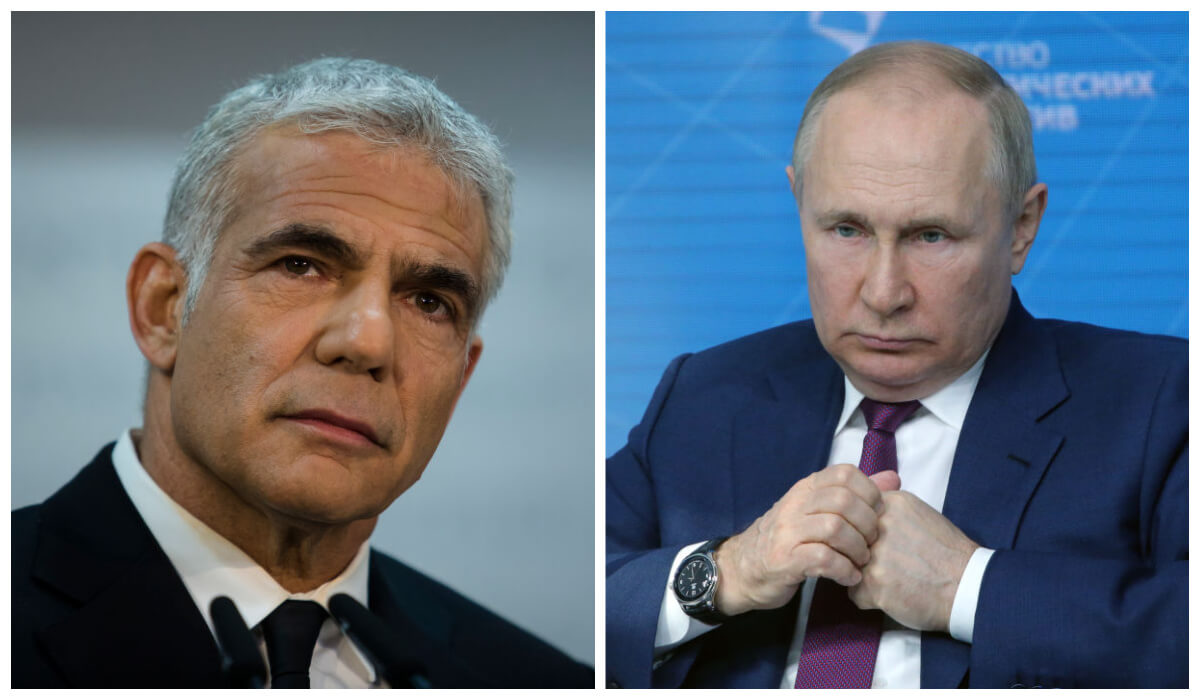Israeli delegation heads to Russia for talks on Jewish Agency crisis
Israeli officials head to Moscow day before preliminary court hearing in case to shut down the Jewish Agency’s operations in Russia

Israeli Prime Minister Yair Lapid and Russian President Vladimir Putin. Photo by Getty Images
This article originally appeared on Haaretz, and was reprinted here with permission. Sign up here to get Haaretz’s free Daily Brief newsletter delivered to your inbox.
Prime Minister Yair Lapid is sending an Israeli delegation to Moscow Wednesday evening to hold meetings with Russian officials as ties between the two countries remain fragile over the Kremlin’s threats to potentially close down the Jewish Agency’s operations there.
The departure of an Israeli delegation to Moscow was initially postponed on Sunday because Russia was yet to give its approval to hold talks over its Justice Ministry’s request to dissolve the Jewish Agency on Russian territory.
The Russian Justice Ministry appealed to a court in Moscow last week with a request to shut down the Jewish Agency, which operates in the country as an independent Russian organization, with preliminary court hearings set to take place Thursday.
As of now, it is difficult to assess whether the court will make a major decision in the case. The hearing will be preliminary and technical, so it will be held in camera in the presence of only the two parties, court officials told Haaretz.
Nonetheless, the Jewish Agency and the Foreign Ministry say it is possible that the public and journalists will be allowed to attend too. The affair has attracted the attention of the Russian press, so the Russian media is expected to send reporters to the courthouse – even if they are not allowed into the hearing.
Now, the last-minute Israeli delegation heading to Moscow will be able to meet with Russian officials face-to-face before the opening of Thursday’s preliminary discussion.
The Jewish Agency expects that the parties will be sent for a mediation process at the end of the preliminary hearing – which would be a positive scenario as far as the agency is concerned. At the same time, the Jewish Agency believes that its fate will not be decided in the Moscow court, which lacks judicial independence.
“The Kremlin always protected Jewish organizations from annoyances on the part of local bodies and security services,” former Jewish Agency chairman Natan Sharansky told Haaretz. “What Putin needs now is to show everyone that he is not isolated, and he sees Israel as the weak link that can be pressured, because it actually acted with such a lack of decisiveness concerning Ukraine. This is a typical tactic of the KGB – to put pressure on someone who is having doubts.”
Earlier in July, Russia’s Justice Ministry has asked a Moscow court to order the Jewish Agency shut, citing a violation of Russian law. It has been operating in the country for 30 years as an independent Russian organization.
The Russian Foreign Ministry’s Zakharova blasted Israel earlier for its response to President Vladmir Putin’s invasion of Ukraine: “Unfortunately, in recent months we have heard, at the level of official statements, unconstructive and, especially, non-objective rhetoric.”
However, Kremlin Spokesperon Dmitry Peskov said that Russia has legal questions regarding the organization that helps Jews emigrate to Israel, and that the issue shouldn’t be “projected” onto bilateral relations with Israel.
Earlier this week, Lapid said that shuttering the Jewish Agency’s operations in Russia “would be a serious event with repercussions on ties,” ordering the Foreign Ministry to devise a list of possible responses to Russia if it takes place. After a leak of those possible steps, several Israeli officials warned that such moves may lead to an escalation and ultimately undermine Israeli interests.














